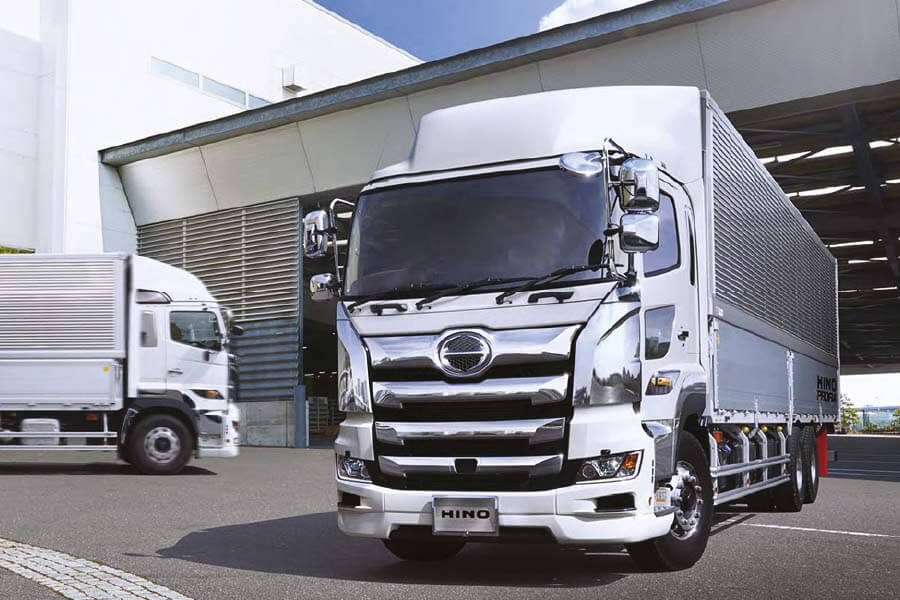Aeolus Truck & Driver News


Hino in emissions strife
Aeolus Truck & Driver News
Hino Distributors (NZ) says a voluntary investigation into misconduct relating to regulatory engine performance and emissions tests in Japan, doesn’t affect any vehicles sold in New Zealand.
In Japan, Hino Motors has suspended sales of Ranger (500 Series) and Profia (700 Series) truck models and also the S’elega bus equipped with three of its engine variants. The scope of the investigation involves about 115,000 vehicles sold since 2016.
A statement provided to NZ Truck & Driver from Hino Distributors (NZ) says:
“Hino Motors Ltd. has identified past misconduct in its Japanese business in relation to applications for certification concerning the emissions and fuel economy performance for three of its engines in the Japanese market, and voluntarily commenced an investigation.
“The suspension of sale in Japan affects engines certified by the Japanese regulator, which have not been sold in New Zealand. The on-going investigation is concerned with engine emissions and fuel economy testing. It has no bearing on vehicle safety.
...Hino Distributors (NZ) says a voluntary investigation into misconduct relating to regulatory engine performance and emissions tests in Japan, doesn’t affect any vehicles sold in New Zealand.
In Japan, Hino Motors has suspended sales of Ranger (500 Series) and Profia (700 Series) truck models and also the S’elega bus equipped with three of its engine variants. The scope of the investigation involves about 115,000 vehicles sold since 2016.
A statement provided to NZ Truck & Driver from Hino Distributors (NZ) says:
“Hino Motors Ltd. has identified past misconduct in its Japanese business in relation to applications for certification concerning the emissions and fuel economy performance for three of its engines in the Japanese market, and voluntarily commenced an investigation.
“The suspension of sale in Japan affects engines certified by the Japanese regulator, which have not been sold in New Zealand. The on-going investigation is concerned with engine emissions and fuel economy testing. It has no bearing on vehicle safety.
“None of the vehicles and engines subject to this sale suspension announced in Japan are being sold in the New Zealand or Australian markets. Hino Distributors (NZ) Ltd is the sole authorised importer and distributor of new Hino trucks. Hino Motors (Japan) has alerted Waka Kotahi to the announcement and is committed to engaging with the relevant authorities about these matters.
“Hino Motors has apologised for any inconvenience caused to its customers and advised that they are not required to take any action and may continue to use their vehicles. There are no implications for the New Zealand market at this time.”
The New Zealand distributor says it’s not expecting any manufacturing delays or interruptions to the supply of new Hino trucks to the New Zealand market as result of the actions in Japan.
Hino’s investigations centre on engine performance data in emissions durability testing for the A05C (HC-SCR) medium-duty engine, and in the measurement of fuel consumption in certification tests for the A09C and E13C heavy-duty engine.
A problem has also been identified concerning the fuel economy of the N04C (Urea-SCR) light-duty engine. However, no misconduct in relation to the certification testing of this engine has been identified to date.
Hino says the issues were uncovered following the identification a certification problem for the North American market. A voluntary investigation by Hino then uncovered the inaccuracies for the three engines.
Subsequently, the U.S. Department of Justice has commenced an investigation. Hino is fully cooperating with the relevant authorities.
Hino then expanded the investigation to review emissions certification for engines certified to 2016 Japanese standards. In conjunction with that investigation, Hino has also conducted emissions and fuel economy verification testing.
During durability testing for emissions performance of the A05C (HC-SCR), engine, it’s been discovered the second muffler of the NOx-reducing after-treatment system was replaced during the test and the test was continued using the replaced muffler.
This change was made after learning that emissions performance would deteriorate over time and that the engine may not meet the regulatory emissions standards.
Findings related to the A09C and E13C engines discovered that, while measuring fuel consumption in a certification test, the fuel flow rate calibration value of the dynamometer panel was altered to make it appear advantageous in relation to fuel economy.




 + EQUIPMENT GUIDE - FREE
+ EQUIPMENT GUIDE - FREE
